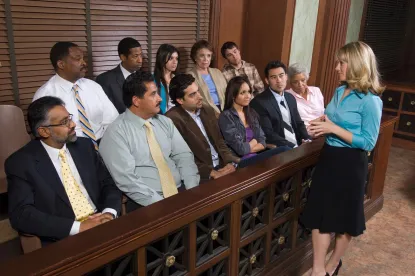The jury renders its verdict. No party objects. The judge thanks the jury for its service, discharges them, and tells them they are free to go. The jury exits, but there’s one problem: the jury’s verdict is internally inconsistent. Is it too late to call the jury back to rectify the inconsistencies in its verdict?
This was the question facing the Supreme Court in the case of Dietz v. Bouldin, decided earlier this month. After the jury delivered a verdict of $0 in damages, the judge discharged the jury and the jurors left the courtroom. However, the judge quickly realized that the jury’s verdict was legally impermissible: the parties had stipulated that medical expenses of $10,136 were owed, and the only question for the jury to decide was whether the award should be even higher.
You’re the judge. You’d “hate to just throw away the money and time that’s been expended in this trial,”[1] and you’ve been informed that no juror had left the building except for one, who had just gone to get a hotel receipt and bring it back. Can you rescind your discharge order, reempanel the jury, and give an instruction to remedy this legally impossible verdict?
According to the SCOTUS, the answer might be “yes” — if you are the judge — but a judge’s discretion to do so can only be exercised under very narrow circumstances.
Writing for a 6-2 majority, Justice Sotomayor reasoned that the inherent power to rescind a discharge order and recall a dismissed jury… must be carefully circumscribed, especially in light of the guarantee of an impartial jury that is vital to the fair administration of justice.[2] The real danger is the possibility that the jury has become tainted since discharge. Indeed, “[a]ny suggestion of prejudice”[3] counsels against reempaneling the jury.
To ensure that there is not even a hint of a “tainted jury,” the judge should consider numerous factors, any of which could inform a decision in a particular case. How much time has passed since the jury was discharged? Even a few minutes could be too long. Have the jurors discussed the case with any non-jurors? Even apparently innocuous comments about the case from someone like a courtroom deputy such as “job well done” may be sufficient to taint a discharged juror.[4] What was the reaction to the verdict? If emotions were broadcast to the jurors, it is possible they could begin doubting whether they made the right call. Courts should consider these and all other relevant factors, including whether jurors checked their smartphones or the internet.
The Dietz ruling is ultimately not earth-shattering: If a court is able to quickly hit the rewind button before even a whiff of a tainted jury presents itself, then the interests of judicial economy can prevail by considering reempaneling the jury.
Can a Non-Objecting Party Request the Jury Be Reempaneled?
What if the judge does not address an inconsistent verdict on his or her own? Under Dietz, can a party who failed to object to inconsistent verdicts before the jury was discharged seek to reempanel the jury? Absent unusual circumstances, probably not.
It is well-settled that a party who fails to object to the jury’s verdict on the grounds of inconsistency prior to the jury’s discharge waives that objection.[5] The requirement that a party object prior to the jury’s discharge exists “to promote the efficiency of trials by allowing the original deliberating body to reconcile inconsistencies without the need for another presentation of the evidence to a new body.”[6] Because concerns of judicial economy motivate both practices, it is possible that a non-objecting party could ask the judge to exercise his or her discretion under Dietz. However, Dietz does not address the question of waiver, and the party’s failure to raise their objection in a timely manner may still cut against a judge’s willingness to exercise his or her discretion to reempanel the jury.
Ultimately, Dietz should not affect best practices: to avoid waiving your objection to an inconsistent jury verdict, be sure to make your objection before the jury is discharged.
[1] Dietz v. Bouldin, No. 15-458, 2016 WL 3189528, at *4 (U.S. June 9, 2016).
[2] Id. at 6.
[3] Id. at 7 (emphasis added).
[4] Id. at 8.
[5] Austin v. Paramount Parks, Inc., 195 F.3d 715, 725-27 (4th Cir. 1999) (concluding that the district court properly denied a motion for entry of judgment because the defendant did not object to alleged inconsistencies in the verdict prior to the jury’s discharge); see also Mason v. Ford Motor Co., 307 F.3d 1271, 1275-76 (11th Cir. 2002) (holding that the defendant’s “failure to raise its objection before the jury was discharged waived the right to contest the verdicts on the basis of alleged inconsistency”); Howard v. Antilla, 294 F.3d 244, 250 (1st Cir. 2002) (holding that, where a jury found for plaintiff on a false light claim but not a defamation claim, the defendant forfeited her ability to challenge the inconsistent verdicts by failing to raise her objection “before the discharge of the jury”).
[6] Austin, 195 F.3d at 725 (quoting White v. Celotex Corp., 878 F.2d 144, 145 (4th Cir. 1989)).



 />i
/>i

